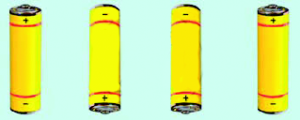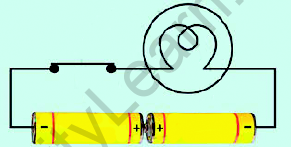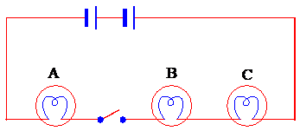Table of Contents
NCERT Class 7 Science Chapter 14 Electric Current and Its Effect Updated for 2024–25
The NCERT Solutions for Class 7 Science Chapter 14 Electric Current and its Effects are crucial for the students of 7th standard. The NCERT solutions are provided here to help students understand the chapter in an easy and interesting way. These NCERT Solutions for class 7 are created by subject experts according to the latest CBSE syllabus (2024-2025). Students must practise these solutions regularly to prepare effectively for their examination. Check out Science all chapter of Class 7 Science NCERT Solutions given in PDF form.
NCERT Solutions for Class 7 Science Chapter 14 PDF Download
In below pdf we have provided NCERT class 7 science chapter 14 pdf question answer from class 7 science NCERT textbook
NCERT Solutions for Class 7 Science Chapter 14 Question Answer
Here are all the class 7 science chapter 14 question answer form NCERT textbook chapter 14 Electric Current and Its Effect for the year 2024-25
Class 7 Science Chapter 14 Exercise Question Answer Page No. 170-173
1.Draw in your note book the symbols to represent the following components of electrical circuits connecting wires, switch in the “off” position, bulb, cell, switch in the “ON” position and battery.
A.
| Connecting wire |
| Switch in “off” position |
| Electric bulb |
| Electric cell |
| Switch in “on” position |
| Battery |
2.Draw the circuit diagram to represent the circuit shown below.

A.The circuit diagram is showing the switch in “off” position.

3.The following figure shows four cells fixed on a board. Draw lines to indicate how you will connect their terminals with wires to make a battery of four cells.

A.To obtain a maximum voltage, cells are connected in series i.e negative (– ) end of one cell is connected to positive (+) end of another cell so on.

4.The bulb in the circuit shown in figure does not glow. Can you identify the problem ? Make necessary changes in the circuit to make bulb glow.

A.In the given circuit electric cells are not connected properly. The positive terminal of one cell is connected to positive terminal of second cell, so the circuit is open. To make the circuit closed, connect the positive terminal of one cell to negative terminal of second cell. Now the bulb will glow.

5.Name any two effects of electric curent ?
A.Heating effect of current : When an electric current passes through a wire, the wire gets heated up this is known as heating effect of current. It is used in many appliances like electric heater, electric iron box, light bulb etc.
Magnetic effect of current : When an electric current pass through a wire it behaves like a magnet. This effect is called magnetic effect of current. If the current carrying wire is wrapped around an iron piece acts as an electro magnet. Magnetic effect of electric current has many appliances like power lift, electric bell, electric fan etc.
6. When the current is switched on through a wire, a compass needle kept nearby gets deflected from its north – south position explain?
A. The current carrying wire produces magnetic field around it. It causes deflection of magnetic needle. When the current is switched off, there is no magnetic field produced by the wire, magnetic needle does not deflect from its north – south position.
7. Will the compass needle show deflection when the switch in the circuit shown in figure is closed?
A.No the compass needle should not show any deflection even though the switch is closed, because in the given circuit there is no source of electric current. The source of electric current like cell (or) battery is necessary to pass electric current through circuit. If electric current is pass through wire around the compass then due to the magnetic field compass needle will deflect.
8. Fill in the blanks :
a) Longer line in the symbol for a cell represents. its Positive
b) The combination of two or more cells is called a
c) When current is switched ‘on’ in a room heater, it becomes hot due to heating effect of electric current.
d) The safety device based on the heating effect of electric current is called a fuse.
9. Make ‘T’ if the statement is true and ‘F’ if it is false :
a) To make a battery of two cells, the negative terminal of one cell is connected to the negative terminal of the other cell [ F ]
b) When the electric current through the fuse exceeds a certain limit, the fuse wire melts and breaks. [ T ]
c) An electromagnet does not attract a piece of iron. [ F ]
d) An electric bell has an electromagnet. [ T ]
10.Do you think an electromagnet can be used for separating plastic bags from a garbage heap ? explain ?
A. No, electromagnet cannot be used to separate plastic bags from garbage heap because it can attract only magnetic materials like iron, steel etc., plastic is non magnetic material, so it is not attracted by electro- magnet.
11. An electrician is carrying out some repairs in your house. He wants to replace a fuse by a piece of wire would you agree ? Give reasons for your response ?
A. No, A fuse is a safety device which prevents damages to electrical circuit and possible fires.They are made of special material which melt quickly and break when large electric currents are passed through them. If the electrician uses any ordinary electric wire as fuse, it increases the risk of overheating of wires due to the flow of excessive current. It may lead to short circuit in electric equipments and these appliances may catch fire. So it is advised to use standard fuse wire of MCBs carrying ISI mark.
12. Zubeda made an electric circuit using a cell holder a switch and a bulb when she put the switch in the ‘ON’ position, the bulb did not glow. Help Zubeda in identifying the possible defects in circuit.

.A.Following can be possible reasons
1) The bulb may be fused due to broken element (or) filament
2) Cells are not connected properly i.e + ve terminal of first cell should be connected to – ve terminal
3) There may be loose connections i.e., wire is not connected properly to switch or to the bulb
4) The switch is not functioning well
5) The cells are dried up
13. In the circuit shown in figure.

i) Would any of the bulb glow when the switch is in ‘OFF’ position ?
ii) What will be the order in which the bulbs A,B and C will glow when the switch is moved to the ‘ON’ position ?
A. i) None of the bulb will glow when the switch is in the ‘off’ position, since the electric circuit is not closed
ii) When the switch is moved to “ON” position, circuit is complete and electric current will flow immediately. All of the bulbs will glow instantly.
- Chapter 1 Nutrition In Plants
- Chapter 2 Nutrition in Animals
- Chapter 3 Fibre to Fabric
- Chapter 4 Heat
- Chapter 5 Acids, Bases, and Salts
- Chapter 6 Physical and Chemical Changes
- Chapter 7 Weather, Climate, and Adaptations of Animals to Climate
- Chapter 8 Winds, Storms, and Cyclones
- Chapter 9 Soil
- Chapter 10 Respiration in Organisms
- Chapter 11 Transportation in Animals and Plants
- Chapter 12 Reproduction in Plants
- Chapter 13 Motion and Time
- Chapter 14 Electric Current and Its Effects
- Chapter 15 Light
- Chapter 16 Water: A Precious Resource
- Chapter 17 Forests: Our Lifeline
- Chapter 18 Wastewater Story
Important Topics Covered in NCERT Science class 7 Ch 14 Solutions
- Symbols of Electric Components,
- Heating effect of electric current,
- Magnetic effect of electric current,
- Electromagnet,
- Electric bell.
Getting well versed with electric current Class 7 concepts is very crucial for students. Current topics given in NCERT Class 7 textbooks play a pivotal role in examinations. It is very important to practise the symbols, circuit diagrams, formulae and problems to score good marks. At INFINITY LEARN, downloadable files of e-books, notes, pdf, solved previous year question papers are available for students to start their exam preparation without delay.
To know more about how to represent electric components by symbols, draw circuit diagrams, the Heating effect of current and its applications, Electric fuse, Magnet like behaviour of electric current while flowing through wire, Electromagnet, Applications of electromagnets etc, sign up with INFINITY LEARN the learning app. Once you have registered with INFINITY LEARN access to the online course is very simple.
| Check Subject-Wise Free Study Materials for Class 1 to 12 | |||
| Physics | Chemistry | Maths | Biology |
| Articles | |||
| Physics Articles | Chemistry Articles | Maths Articles | Biology Articles |
| Topics | |||
| Physics Topics | Chemistry Topics | Maths Topics | |
| Difference Between Articles | |||
| Formulas | |||
| Physics Formulas | Chemistry Formulas | Maths Formulas | |
Apart from NCERT Solutions for Class 7 Science Chapter 14, get NCERT Solutions for other Class 7 science chapters here. Students can download worksheets, assignments, NCERT Class 7 Science Solutions and other study materials for exam preparation and score better marks.
FAQs on NCERT Solutions for Class 7 Science Chapter 14
What is electric current and its effects Class 7?
In Class 7, the chapter Electric Current and Its Effects covers the basics of electric current, including its flow, the heating effect, and the magnetic effect. It also discusses electrical components like fuses and circuit breakers.
What is the magnetic effect of electric current class 7 answer?
The magnetic effect of electric current is that when an electric current flows through a wire, it creates a magnetic field around the wire. This property is used to make electromagnets and electric motors.
What is mcb class 7?
MCB stands for Miniature Circuit Breaker. It is a device used in electrical circuits to automatically cut off the flow of electric current if it exceeds a certain limit. MCBs are safer and more convenient than regular fuses.
What is the SI unit of electric current?
The SI unit of electric current is the ampere (A). It is a measure of the rate of flow of electric charge through a given point or surface.
Where can I get the NCERT Solutions for Class 7 Science Chapter 14?
You can get the most detailed and accurate solutions from INFINITY LEARN. The top educators who possess excellent subject knowledge have designed these solutions as per the needs of the students. The solutions are framed according to the latest syllabus of the CBSE board to help students score well in the annual exam. So these solutions are present in PDF format which can be downloaded and accessed from the links available at INFINITY LEARN. The solutions can be referred by the students anywhere and at any time without any restrictions.
What are the concepts covered in the Chapter 14 of NCERT Solutions for Class 7 Science?
The concepts covered in the Chapter 14 of NCERT Solutions for Class 7 Science are – 1. Symbols of Electric Components, 2. Heating effect of electric current, 3. Magnetic effect of electric current, 4. Electromagnet, 5. Electric bell.
Is the NCERT Solutions for Class 7 Science Chapter 14 free of cost?
Yes, the NCERT Solutions for Class 7 Science Chapter 14 is absolutely free of cost. The chapter wise and exercise wise PDF links are present at INFINITY LEARN which can be downloaded and accessed by the students based on their needs. For a good score in the annual exam, students should refer to the solutions while answering the questions present in the textbook. All the important concepts are covered in the solutions to help students gain a grip on the concepts which are important from the exam point of view. By regular practice, students will be able to analyse the areas which they are weak at and work on them for a better academic performance.










